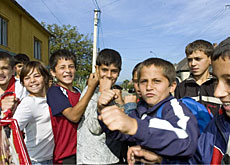Row over Swiss funds to poor EU countries

Parliament is facing calls by non-governmental organisations to ensure that Swiss funding for the European Union does not come from development aid.
Alliance Sud said the money set aside by Switzerland for the cohesion funds to support Europe’s weaker economies, should come from other sources.
Switzerland agreed to pay SFr1 billion ($840 million) towards the cohesion funds over a five-year period when it signed the second series of bilateral agreements with the EU in May 2004.
But more than a year on the question of where the money will finally go still has to be solved.
Switzerland wants the funds to go to the ten new – and mostly eastern European – member states, but Spain, Portugal and Greece have all lodged a claim.
At a media conference in Bern on Tuesday, Alliance Sud called on the government and parliament not to take the money from the development aid budget.
Its stance is supported by more than 300 personalities from across Switzerland, including the former president of the International Committee of the Red Cross, Cornelio Sommaruga and the adventurer, Bertrand Piccard.
The Swiss payment to the EU’s cohesion funds is due to be discussed by the Senate’s Foreign Affairs Committee later this week.
Poor and rich
“The contribution to the EU’s cohesion has nothing to do with development aid,” said the Alliance Sud’s Bastienne Joerchel.
The poor would have to pay for the rich if the promised money were to be taken from the regular aid budget, she added.
Peter Niggli, the NGO’s director, said that funding could come from the extra revenues made from concluding the bilateral accords.
He said that profits from the 16 agreements were expected to amount to at least SFr152 million per year.
The Alliance Sud president, Franz Schüle, pointed out apparent contradictions.
“Mali and Mozambique, two priority countries for Swiss cooperation aid, do not get any benefit from the fact that Switzerland could keep its banking secrecy. How can we explain such an attitude to the rest of the world?”
Bilateral treaties
The second set of bilateral treaties were concluded in 2004 after the Swiss and the EU finally reached a deal over tax.
Switzerland will now progressively introduce a withholding tax of 35 per cent on the savings income of EU residents but can keep its cherished banking secrecy.
Closer security and asylum cooperation with the EU is also part of the second set of bilateral agreements. Swiss voters approved the Schengen/Dublin accords in a nationwide ballot earlier this year.
Other accords cover the fight against customs fraud, education, media, statistics and processed agricultural products.
swissinfo with agencies
Alliance Sud is made up of six major Swiss development organisations: Swissaid, Catholic Lenten Fund, Bread for All, Helvetas, Caritas and Interchurch Aid.
They are calling for the Swiss contribution to the EU cohesion fund not to come from the aid budget.
Switzerland has promised to contribute SFr1 billion to the EU’s Cohesion Fund, at a rate of SFr200 million per annum for five years.
The EU wants a binding agreement with the Swiss over their contribution, while Bern only wants a memorandum of understanding.
The Swiss also want their contribution to only go to the ten new EU member states, but Greece, Spain and Portugal want a share of the funds.

In compliance with the JTI standards
More: SWI swissinfo.ch certified by the Journalism Trust Initiative










You can find an overview of ongoing debates with our journalists here . Please join us!
If you want to start a conversation about a topic raised in this article or want to report factual errors, email us at english@swissinfo.ch.